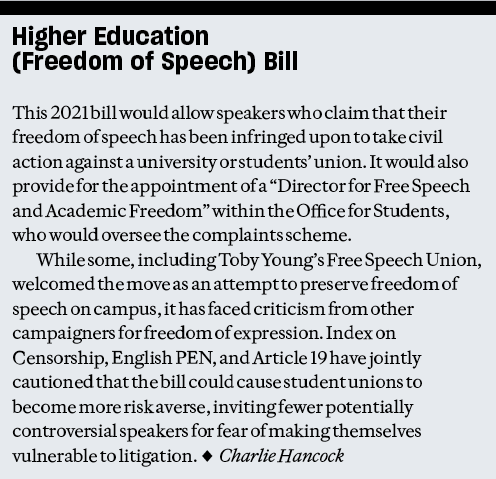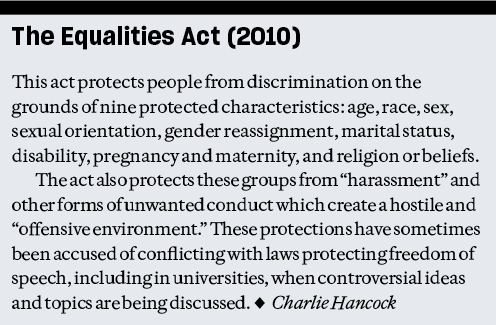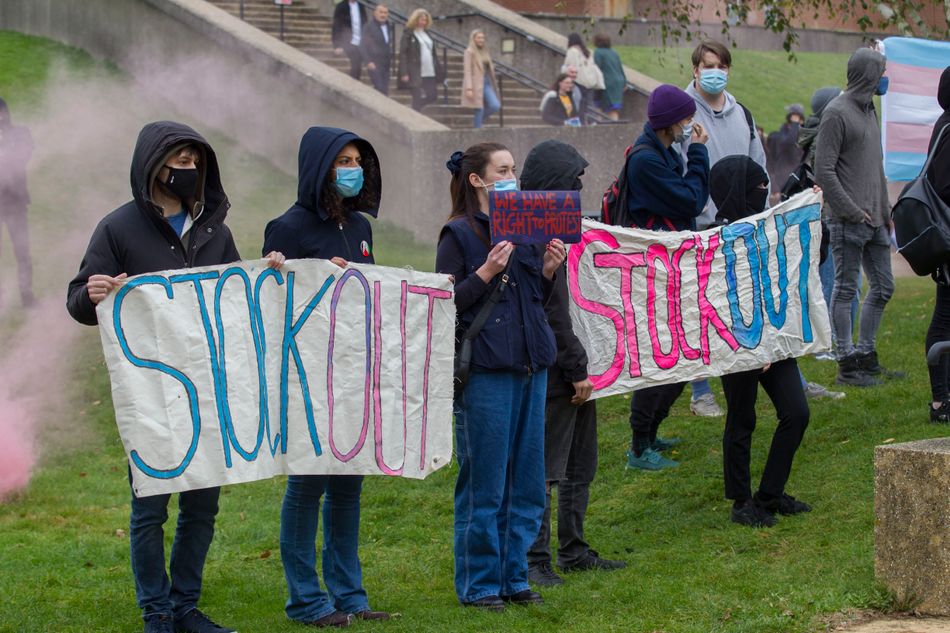As universities minister, I experienced first hand the battle for freedom of speech on our campuses. I gave speeches against a background of barracking and noisy protest. I was shouted down trying to deliver a lecture at Cambridge—one of the saddest days of my time as minister. But then I think of what happened during a visit to the University of Southampton. There was a group of students and academics with a megaphone shouting their criticisms of my university policies. I always tried to speak to the protesters if possible, so I went over and attempted to engage with their criticisms. They lent me their megaphone to hear what I was saying. I then handed it back and we had a real exchange. That moment, in the most unpropitious of circumstances, stays with me as the embodiment of what the university really stands for.
There is a long history of student protests—it is part of the transition to adulthood. One former protester looking back reflected: “I spent significant periods of my first degree course in occupation of college premises. It taught me skills of organising, public speaking, and publicity that I would not have learned in lectures and that have stayed with me since.”
Now there is a new threat to freedom of speech: identity politics. Beliefs are seen as fundamental to identity, so disagreement about them becomes a challenge to a person’s sense of self. This is associated with an intellectual school—critical theory—which was itself developed in universities. It holds that society systematically oppresses minority groups, and that language is one of the tools used to do so. Policing what we say, therefore, is a battle against oppression.
Many a university lecturer now lives with the anxiety of saying something to which a student replies, “I find that offensive.” Universities fear being marked down on student satisfaction metrics, or worse. They are supposed to be places for rigorous intellectual enquiry, but instead academics find that setting out certain arguments or researching certain topics requires them to walk on eggshells.
Social media campaigns intensify the threats. And these are not just threats to students who need to learn through disagreement and challenges. Alice Dreger shows in her excellent book Galileo’s Middle Finger that academic research itself is still vulnerable to the suppression of inconvenient truths and awkward data.
Any society or institution—like a university—needs taboos and inhibitions. Indeed, one way that civilisation advances is through the development of new inhibitions and stronger self-control. But critical theory goes beyond this to a doctrine of collective guilt in which we are all part of a structure of oppression regardless of our actual views. It is the intellectual basis for “microaggressions,” monitoring of which was proposed in a draft document by Cambridge University that was leaked and then disowned.
This extreme sensitivity to language and behaviour is the basis for the charge that students are now snowflakes who need protection against being upset. Greg Lukianoff and Jonathan Haidt argue in The Coddling of the American Mind that the attempt to protect supposedly fragile students is paradoxically a threat to students’ own wellbeing. Believing in one’s structural victimhood, they argue, is a powerful driver of depression and mental illness. To thrive, students require the opposite: resilience and a belief that one can shape one’s own life.
Decolonising the curriculum arises from critical theory. It sees the university as part of an oppressive system, because it converts the standpoint of advantaged westerners into a set of supposedly universal truths that privileges our history and our literature over all others. But there are other pressures on the curriculum. I have seen this at the University of Leicester, where I serve as chancellor. The Department of English had declining applications, and not many of the students who did apply wanted to study medieval English. Market forces meant that the university had to let go of some of the academics specialising in this subject. The Daily Mail and the education secretary of the time Gavin Williamson denounced this as an example of decolonising the curriculum. The opposition to Leicester’s decision came from an unusual alliance of left-wingers defending academic staff from market forces and right-wingers unhappy at the erosion of tradition.

The willingness to believe the worst about such decisions arises from the anxiety that universities are a hostile environment for conservatives and that they indoctrinate students with left-wing beliefs. Donald Trump’s remark “I love the poorly educated” hovers over this debate. There are British conservatives who fear that universities produce Labour voters, and so believe that the numbers going there should be limited. Young people are indeed changed by the experience of three years or more at university, but not as crudely as feared. They become more tolerant of diversity. But they also become more individualistic and more sceptical of the power of the state. The Conservative Party’s problem is really with young people, not just with those who went to university.
Then there are the academics. The Adam Smith Institute produced a paper “Lackademia” arguing that left-wing views are overrepresented in academia and that this lack of ideological diversity is a real problem. Much of the research is American and the issue may be more acute there. The links between Christian fundamentalism and conservatism makes, for example, denial of evolution (and climate change) an important part of the mindset of many American conservatives and puts them at war with the academy. Moreover, attitudes may vary, both between individual academics and between disciplines—there are academics in applied sciences who have spun out a company from their research and have a Porsche sitting in the university car park.
If academia is thought to be homogeneously on the left and hostile to different views, then the government loses trust in them to protect freedom of speech and steps in with legislation. It is what happened in 1986 with legislation for freedom of speech on campuses. It is happening again with the Higher Education (Freedom of Speech) Bill currently in the House of Commons. It covers two separate issues—academic freedoms for university staff who may not share the conventional wisdom of their colleagues, and freedom of speech for those visiting campus to speak to students.
Academic freedom is a rather special and distinctive freedom that does not just guarantee academics freedom of enquiry but also enables them to shape and police the boundaries of their own disciplines. The classic exposition is Immanuel Kant’s Conflict of Faculties written in response to threats from the king of Prussia of “unpleasant measures” if he continued with his “obstinacy” in challenging theological doctrine. Kant’s reply was that while the theology faculty may have a duty of working within a framework of Christian doctrine (“private reason,”) the philosophy faculty has to be able to argue freely (“public reason”).
Some of the great battles for academic freedom are actually about excluding ideas that are not part of the discipline. One of the issues that arose in the 1925 State of Tennessee v John Thomas Scopes trial, which concerned state legislation requiring the teaching of creationism in schools, was that it was not right to require religious beliefs to be taught as part of a science course. I met an academic from the Middle East who had lost his job because he objected to Islamic teaching on creation appearing in a science course. Eventually, he got his job back when his university relented and agreed that such religious beliefs should be taught as part of theology and not science. Now climate change denial is not acceptable as part of environmental science.
This power to police their discipline is one of the special features of academic freedom and it is rather ambitious of the government to try to legislate a framework for it. But the departure of Kathleen Stock from her post in the philosophy department of the University of Sussex is a dispiriting example of the problem that prompted them to act. As a progressive, she is concerned that the gains of feminism are threatened by regarding people who are biologically female not as “women”—a self-description increasingly available to anyone who wants it—but “cervix-havers” and “menstruators.” She did not get wholehearted support from the academic community and her fellow philosophers. She eventually resigned from her post because of an unpleasant campaign against her. But lurking underneath is the same problem as the one faced by Kant—about who has the power over what could be said within a discipline—though this time the threat was not the king of Prussia, but an employment tribunal. Referring to an employment tribunal’s preliminary ruling against Maya Forstater—who, in 2018, lost her job at the Centre for Global Development—Kathleen Stock was concerned about the implications of this ruling:
I am a professor of philosophy, employed at a British university in a philosophy department. Today, a UK employment tribunal judge ruled that the belief that biological sex is immutable, and that it is impossible to change one’s sex, is “incompatible with human dignity and fundamental rights of others.”
The anxiety about what this might mean for Stock’s views, or indeed her work as a philosopher, was palpable. But the problem was not simply intolerant universities—it was the court’s interpretation of employment law and the equality duty that binds universities like everyone else. The employment tribunal’s preliminary ruling was challenged by Forstater and in 2021 its decision was overruled. (However, whether Forstater was discriminated against for her beliefs is still being decided.) A 2021 investigation into a separate no-platforming incident at the University of Essex found that there was a misunderstanding of the equality duty, as the protected characteristic is gender reassignment, not gender identity. The independent review said the university’s policy “states the law as Stonewall would prefer it to be, rather than the law as it is.”
There have also been shocking examples of no-platforming by student societies, such as the ludicrous disinviting of Amber Rudd. But it is not clear that no platforming is as widespread as, for example, the Policy Exchange report cited by ministers suggests. Moreover, the government itself has adopted the old NUS policy of no-platforming. For most of the past decade, the Prevent duty has been aiming to stop Islamic extremists being invited on to campus. Pressure was put on universities not to invite extremist speakers—even if their remarks were not illegal.

Prevent is still in force and now has its own legal protection, which the government claims is not changed by the proposed new freedom of speech legislation—though there is clearly a clash of principles. Indeed, all the principles—freedom of speech, equality for protected characteristics, prevention of Islamic extremism—are incorporated in law. Someone has to try to balance them out. And universities themselves, with their traditions of dispute and rational argument, should be the best place to do so: their task is to embrace this role and to rebuild their self-confidence to carry it out.
One of the central purposes of equality in academia is to guarantee that all can participate effectively in free intellectual enquiry. If the model is a research seminar, inequality (only some voices are heard) means a lack of freedom to enquire for others. It will also probably mean less good academic work. The two principles of equality and freedom are intrinsically connected through universities’ core purposes of excellent education and research. This also implies that certain ways of addressing inequalities in higher education are almost always impermissible—how can excluding voices, or silencing people, assist in free intellectual enquiry?
The problem is not just rival principles—it is also rival interpretations of the same principle. What if a visiting Muslim speaker wishes to speak to an audience segregated by gender? That was an illustrative example in a Universities UK document which created a media furore back in 2013. The speaker would appeal to freedom of speech—arguing that it meant he couldn’t be stopped from speaking just because of the proposed seating arrangement of the audience.
The equality duty also has its trade-offs. Feminist campaigners are most vociferous and active in arguing that the extension of transgender rights constrains natal women. These campaigners are predominantly female, a characteristic protected in the Equality Act, so attacking them could itself infringe the equality duty.
These are the tricky issues that student unions and universities wrestle with. Will more legislation help them? The case for more legislation is to stop a retreat from freedom of speech in the same way that regulation on statues, announced months after the statue of slave trader Edward Colston was toppled in Bristol, helped stop a wave of iconoclasm. But the 1986 legislation provides a good framework. The government says it needs to strengthen it, but the measures are clumsy and potentially counterproductive.
The new powers are likely to lead to attempts by provocateurs to catch out universities and drag them into prolonged legal disputes. The bill proposes a general right for anyone to sue a university or student union if they believe either has violated their free speech duties. This could bring case after case into the courts and displace the current efforts of the regulator, the Office for Students (OfS).

There is also an obligation on the OfS to investigate every complaint even if they are mischievous or obviously wrong. The key decisions will not be any easier, but there will be more law and more regulation. And it is just possible that the groups who prove most adept at exploiting the new legislation will be pretty unsavoury—an Islamic extremist group successfully obtaining the right to hold a meeting on campus and a climate change denier claiming a right to remain a member of the environmental science faculty. The most prominent case in the 1980s involved a far-right activist. One can imagine that a case brought forward on the new powers could come from someone like Milo Yiannopoulos or Nick Griffin. Is that really how the government wishes to fight the culture wars?
Meanwhile, the real problem that does need to be tackled is the broadening interpretation of the equalities duty—some of it indeed a misinterpretation—and the increasing weight attached to it. By contrast, the existing legal duty to protect freedom of speech is interpreted more narrowly. Hate speech is not in itself illegal, but universities act as if it is. So less weight is given to freedom of speech. Universities need to shift back to emphasising to students and staff that freedom of speech and thought is crucial for them. Diversity includes diversity of opinion.
When students arrive they could have a welcome that includes a celebration of the fact that different views are not unreasonable or wrong. Student societies operate with increasingly careful guidance and advice on external speakers. They could get more advice on how debates are to be conducted. This is an opportunity for them to learn the reality of freedom of speech. It already enjoys strong legal protection—the challenge is to deliver it in practice. Universities should embrace the challenge of taking a lead in affirming the value of freedom and diversity of enquiry.













